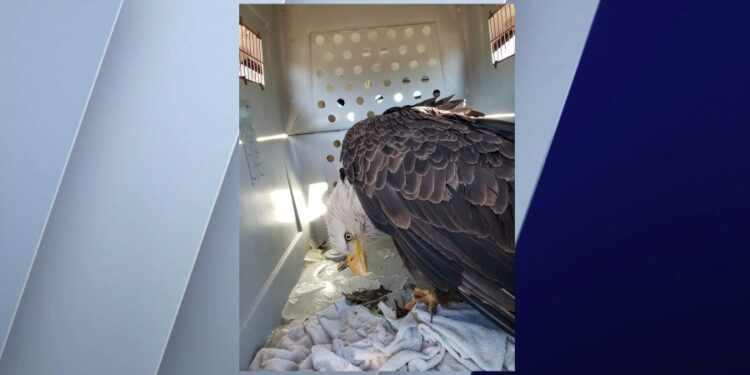
DUPAGE COUNTY, Ill. — Wildlife authorities in DuPage County euthanized a bald eagle that was found to be displaying strong signs of bird flu last week, according to Chicago Bird Collision Monitors.
An official from the conservation organization confirmed Tuesday that the bald eagle was found and rescued on Friday afternoon at Butler Cemetery, located along Madison Street in Oakbrook near the border into Hinsdale.
According to the organization, the DuPage Wildlife Conservation Center determined that the eagle was demonstrating strong signs of avian flu and chose to euthanize it.
Wildlife authorities have not said if they are monitoring other bird flocks in DuPage County for bird flu.
The news comes only a day after a bird flu death was reported in Louisiana. Health officials from the Centers for Disease Control and Prevention confirmed it was the nation’s first death due to bird flu.
The individual was older than 65 years of age, had underlying medical problems and had been in contact with sick and dead birds, health officials said.
Last month, health officials in Wisconsin detected a presumptive positive human case of bird flu in a person who was exposed to an infected flock of commercial poultry.
What is Bird Flu?
Bird flu is caused by avian influenza A viruses and is highly contagious and often fatal to domestic poultry.
The disease can vary in severity depending on the strain and symptoms include:
- Sore throat
- Fever
- Muscle aches
- Cough
- Eye infections (Conjunctivitis)
Health officials warn anyone who has been in contact with animals who may have been infected, or those who develop symptoms of flu or an eye infection, to stay home and contact their physician’s office before visiting, so they can take precautions to ensure other patients are not exposed.
Who is at risk?
According to health officials, while the risk to the general public remains low, those who work with infected animals, or have recreational exposure to them, are at higher risk.
Health officials said the disease can be spread through contact with infected birds, commingling with wild birds or their droppings, equipment, or clothing worn by anyone working with the animals.
While it is safe to eat eggs, poultry and meat that have been fully cooked, as well as pasteurized milk and milk products, health officials said the following safety measures should be taken when handling raw meat and raw eggs:
- Wash hands and surfaces before and after food preparation.
- Avoid using the same utensils on raw meat as on other foods, even cooked meat.
- Cook raw meat thoroughly.
The CDC said it is monitoring the situation carefully and working with states to monitor those with animal exposures.






